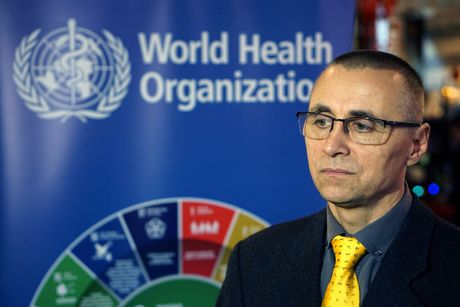Ivanusa: It's still serious, but I hope the worst is over; the new type of virus transmits easier
There are still a lot of people in hospitals

The director of the Office of the World Health Organization (WHO) in Serbia, Marijan Ivanusa, says that he hopes that the most difficult days are behind us when it comes to coronavirus epidemic, that the situation is better - but still serious.
Marijan Ivanusa told RTS this morning that the number of infected people is decreasing, but that there are still a lot of hospitalized people.
"We saw that there were about 8,000 new cases a day, now there are 1,500, 2,000. The situation is much better than before, but those numbers are still large, we see how many people are in hospitals and about a thousand people died during the last month. The situation is still serious, but it is better than it was," said Ivanusa.
He stressed that vaccination is a great hope for the future, and that Serbia is one of the first countries in the world to have started immunization.
"It's going slowly because the amount of available vaccines is limited, not only in Serbia, but also in other countries. All countries are fighting to get as many vaccines as possible," said Ivanusa.
He pointed out that about 50 countries have started vaccination so far.
"The largest number of vaccines per 100 people was used in Israel, 22 doses per 100, while in Spain, which ranks 10th in the world, it's one vaccine per 100 people only. So, we are at the beginning," he added.
Asked how many people need to receive the vaccine in order to achieve collective immunity, Ivanusa says that some calculations said that probably if 60 to 70 percent of the population got vaccinated, that would represent good collective immunity.

"Whether it will stay that way or not, I don't know. We see that a new type of virus has appeared in the UK, which is much easier to transmit. If the virus is more easily transmitted, it will probably take more people with immunity in order to achieve collective immunity," Ivanusa explained.
He stressed that it has been confirmed for now that the available vaccines also protect against the new type of virus.
Speaking about how close we are to announcing the end of the pandemic, Ivanusa said that he is afraid we are still very far from that.
"I believe that some countries will be able to vaccinate the most at-risk groups in a relatively short time, especially those over 80, 70, 60, and then healthcare workers or employees in nursing homes, but globally there will not be enough vaccines available fast enough so that the entire population of the world can be vaccinated at such a high percentage," said Ivanusa.
When it comes to the epidemic situation, Ivanusa says that experience shows that it goes in waves and calms down a bit and then erupts again.
"It all depends on our behavior - how successful we are in maintaining physical distance, wearing masks and hand hygiene. The measures should remain in force as long as there aren't enough vaccines," said Ivanusa.
(Telegraf.rs)
Telegraf.rs zadržava sva prava nad sadržajem. Za preuzimanje sadržaja pogledajte uputstva na stranici Uslovi korišćenja.




